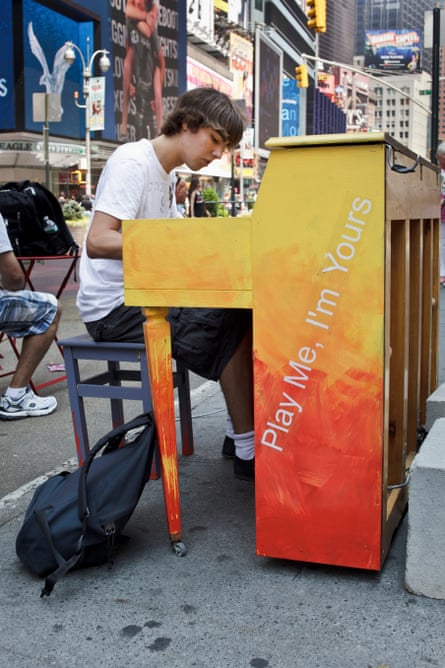For years, it seemed like the piano was disappearing from British public life. The bulky instruments were cast out of homes and schools and offered for free online.
But now – despite all the digital entertainment alternatives and conductor Simon Rattle’s stark warning last week that UK classical music was fighting for its life amid funding cuts – the piano seems to be making a 21st-century comeback in homes, on streets and online.
Piano retailers are reporting strong sales and, according to industry insiders, growing numbers of people are taking up (and returning to) the instrument, thanks in large part to the technology that threatened to replace it, including thousands of free online videos that teach amateur pianists how to play using step-by-step lessons.
“The prominence of the piano afforded by TV, social media and street pianos is encouraging new players to learn,” said Matt Ash, membership and retail lead at the Music Industries Association (MIA), adding that there was a notable increase in interest during the pandemic.
“The availability and huge developments in digital, hybrid and acoustic pianos have reinvigorated choice, making the instrument accessible to a wider range of potential players.”

Comedian and pianist Alistair McGowan, who is launching a piano festival in his Shropshire hometown of Ludlow in May, said the piano’s growing appeal was in part a “lockdown phenomenon”. But also, he said, people sharing three- or four-minute piano pieces online had helped increase enthusiasm for classical music.
“It’s the length of a pop song, as are so many piano pieces. And that’s what I’m trying to capitalise on with the programming.”
He hopes that the four-day festival, which will include performances by internationally renowned pianists Lucy Parham and Charles Owen as well as comedians Jo Brand and Rachel Parris, will inspire people from the community and around the country “to learn about this incredible instrument … and the beauty of playing it at any level”.
McGowan, who returned to the piano aged 49, said that playing the instrument was “good for your soul, it’s good for your spirit”. He added: “Ultimately, it brings great satisfaction, and it’s like a sudoku, a crossword, everything rolled into one. Solving the mystery of a piece bar by bar is just better than any crossword to me.”
Britain’s street pianos, an initiative kicked off in 2008 in Birmingham by artist Luke Jerram, have become such a fixture of urban life that they formed the basis for Channel 4’s recent amateur talent search programme The Piano, hosted by Claudia Winkleman.
Lang Lang, often described as the world’s greatest pianist, was astounded by the depth of talent he came across as a judge on the show. “When I accepted Channel 4’s invitation to be one of the judges on the TV series, I was curious how many promising amateur pianists there would be in the UK,” he told the Observer. “The enormous number of passionate piano players exceeded all my expectations.”
He added: “I met many piano lovers for whom the piano offers solace or a refuge from challenging experiences, a tough life, or a way to turn their innermost selves inside out.”

His foundation launched its music education programme, Keys of Inspiration, which is centred on the piano, in London in September and plans to expand to more schools later this year.
Stephen Pringle, founder of the Sherwood Phoenix piano shop in Mansfield, Nottinghamshire, said: “It is a great time to be in the piano business. Finally, the piano is starting to get the publicity it deserves.”
The largest contributor to growth in piano playing, he added, was YouTube, which had cut the dependence of amateurs on paying for lessons. “That, still to this day, is one of the strongest contributions to piano playing, particularly in the last decade,” he said.
“The largest cost of learning to play piano would be the cost of a lesson, whereas now you can go and pick a favourite YouTube channel and learn to play more or less free of charge as long as you have an instrument and a little bit of discipline.”
In what might seem counterintuitive, digital pianos could be a positive force for piano sellers, he added, acting as a good training ground for first-time piano buyers before they invested in an acoustic one.
“In reality, it is the start of a future generation of piano players, and this results in consumers wanting a real piano in the end. We are already seeing the results of this as being a good thing,” he said.
Jerram said the popularity of his worldwide street piano artwork, Play Me, I’m Yours, has been “extraordinary”. In the 15 years since its launch, the initiative has put 2,000 pianos on streets, in parks, markets and train stations, in 70 cities.
It is no coincidence that this growth – and that of piano playing – had taken place alongside the prevalence of camera phones, he said, since people could both learn the piano and share their accomplishments online.
“With TikTok and YouTube, you can teach yourself to play the piano in a way you couldn’t do 10 or 20 years ago,” he said. “There’s a democratisation of piano lessons.”
Stay connected with us on social media platform for instant update click here to join our Twitter, & Facebook
We are now on Telegram. Click here to join our channel (@TechiUpdate) and stay updated with the latest Technology headlines.
For all the latest Education News Click Here
For the latest news and updates, follow us on Google News.
